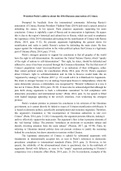President Putin’s address about the 2014 Russian annexation of Crimea
Prompted by backlash from the international community following Russia’s
annexation of Crimea, Russian President Vladimir Putin (2014) delivered a speech aimed at
defending his stance. In his speech, Putin proposes arguments supporting his main
conclusion: Crimea is rightfully a part of Russia and its annexation is legitimate. He argues
this is due to the region’s historical and cultural ties to Russia, which are used to emphasise
the legitimacy of the 2014 referendum advocating for the reunification of Crimea with Russia
(Putin, 2014, para. 4-12). He presents arguments highlighting the general desire for
reunification and seeks to justify Russia’s actions by defending the main claim. He thus
argues against the widespread notion in the wider political sphere that Crimea is a legitimate
part of Ukraine (Putin, 2014, para. 57-61).
Putin’s strongest premise to support his conclusion is that all peoples of the world
have the right to self-determination. He mentions the United Nations Charter, which “speaks
of the right of nations to self-determination”. This right, he states, should be defended and
adhered to, since it has been exercised through the Crimean referendum. The fact that most of
Crimea’s population voted “pro-reunification” is an indication of their willingness, rather
than violent political action, for reunification (Putin, 2014, para. 29-32). Putin’s argument
about Crimea’s right to self-determination and its link to Kosovo would make this an
“argument by analogy,'' as Weston (2017, p. 19) would call it in A Rulebook for Arguments.
His claim is stronger because it is an analogy based upon Kosovo’s independence, where the
same democratic process, a referendum, was recognised by ‘Western’ influences in a way it
has not in Crimea (Putin, 2014, para. 29-32). It must also be acknowledged that although he
puts forth strong arguments to back a referendum considered “in full compliance with
democratic procedures and international norms” (Putin, 2014, para. 2), his speech is filled
with loaded language appealing to the crowd’s emotions, even weakening his strongest
premise.
Putin’s weakest premise to promote his conclusion is his criticism of the Ukrainian
government, as it cannot directly be linked to issues of Crimean reunification with Russia. It
is based on domestic politics, specifically unemployment and economic migration. Therefore,
this argument’s foundation is “the incompetence of Ukrainian authorities to rule over
Crimea” (Putin, 2014, para. 21-26). Consequently, the argument presents fallacies, making it
unfit to effectively support the main point. The argument’s flaw is that it presents elements of
the ‘red herring’ fallacy. The premise “introduces an irrelevant or secondary subject and
thereby diverting attention from the main subject” (Weston, 2017, pp. 93-94). Putin, by
referring to Ukrainian internal politics does not present evidence to justify the reasoning
behind his conclusion, but draws attention to tensions within Ukraine.
The legitimate annexation of Crimea is upheld by substantial arguments with
foundations in internationally accepted law, as seen in Putin’s references to democratic
procedures compliant to international standards (Putin, 2014, para. 2). However, in his
speech, the reliability of the aforementioned claim is questioned, due to the multitude of
arguments flawed with fallacies, as seen in his “empty” argument pertaining to Ukraine’s
competence over a domestic affair (Putin, 2014, para. 21-26). In conclusion, examples of the





